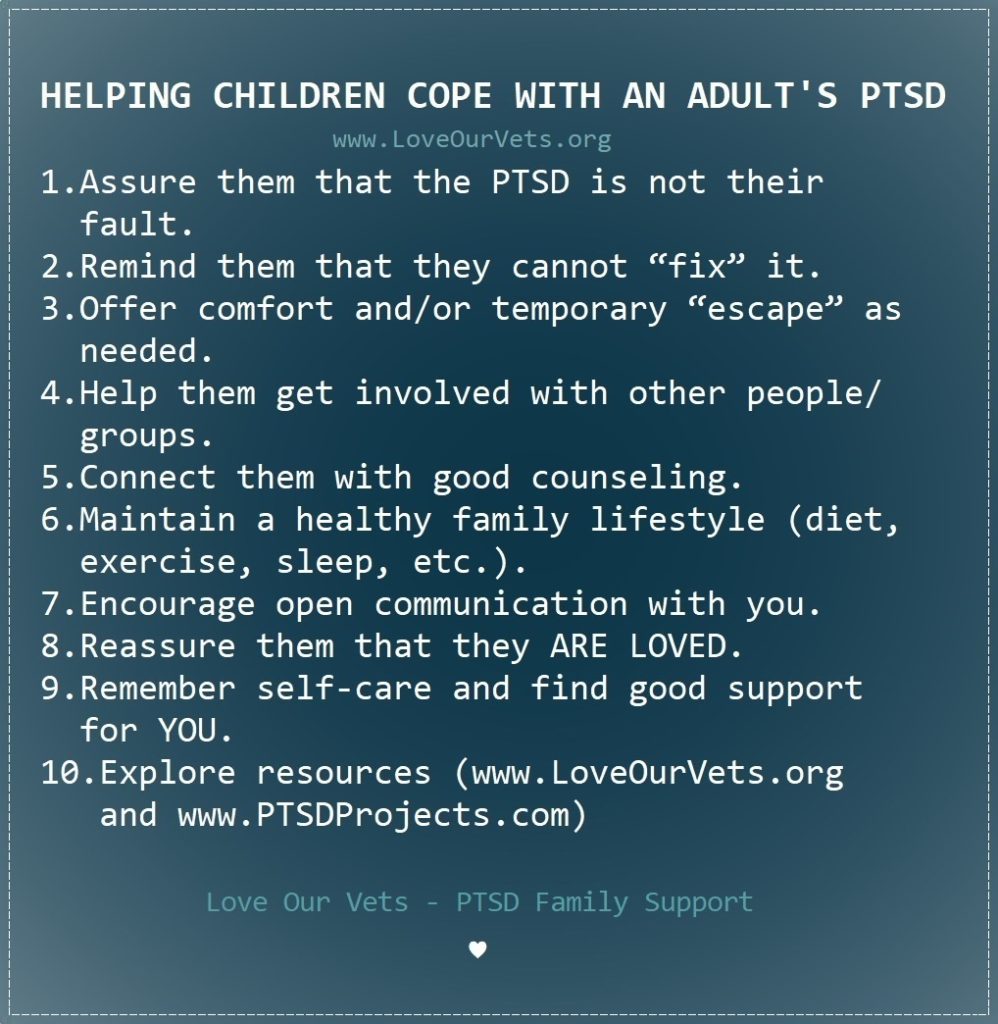Posttraumatic stress deeply and profoundly impacts all those in the home and family. And not only are we adults in survival mode most of the time, we often feel heartbroken and helpless watching our children in their attempts to cope with the wake of the trauma. This guest post by Blue Star Mother C.L. Fontaine offers some encouraging thoughts.
HELPING CHILDREN COPE WITH AN ADULT’S PTSD
By C. L. Fontaine
As a mother and also an educator, I have personally wrestled with this for years. The following are a few things that might help for starters, and I encourage you to follow up by exploring additional options and reaching out for support. (See www.LoveOurVets.org and www.PTSDProjects.com)
1) OFFER SOME COMFORT: This could be their favorite food, prayer, music, snuggling with a pet or special loved one, or talking with a trusted friend or sibling. For others it might be doing Yoga, Tai Chi, or another form of introspective activity or meditation, hopefully in a space apart from conflict. And you can never remind them enough of how much they are loved, even by the parent with PTSD who may have a hard time expressing it.
2) ARRANGE for TEMPORARY ESCAPE: Perhaps they could get together with a friend. Or if at home, it could be reading books, watching TV, or playing electronic games. They might also enjoy doing art or other projects. Again, best done in a room away from any conflict or “drama.”
3) PROVIDE BENEFICIAL DISTRACTION: These activities give children a sense of accomplishment and belonging, and provide a place for their thoughts to go to when disturbed. Some ideas are sports teams, hobbies, or volunteer activities often with a parent. Maybe board games with siblings, or lessons such as music, dance, gymnastics, etc., would be beneficial distractions. You might also look into a Big Brother/Big Sister connection, or church groups.
Prayer and connecting with God is empowering. Prayer teaches us to believe in a power greater than ourselves, trust that we are worthy of love, and know that God hears us when we turn to Him. This is consequential for children who live with uncertainty and sometimes instability. Praying with children offers an insight to their fears and hopes, and also strengthens trust in God.
Even if religion isn’t a factor in your home, belonging to a church family (or institution of faith) is often very helpful for both adults and children. And so much support is often available for personal friendships, youth groups, Sunday schools, church activities, etc. Choosing a church is as important as finding a therapist or counselor that is a good fit.
4) CONNECT THEM with GOOD COUNSELING: This could be a private counselor, perhaps as a family, or with parent and/or siblings. Or the VA if applicable, or clergy, or the school psychologist, might be good resources. If you haven’t already, I encourage you to set up a meeting with your children’s school psychologists. Many are quite knowledgeable about PTSD. A good one will be a resource for your child during difficult times, and can also help pair your child with an appropriate, even-tempered teacher. Schools can’t help if they don’t know the challenges children face.
5) MONITOR THEIR WELL-BEING: It is crucial to be sure they have a healthy diet, plenty of exercise, good sleep habits, regular medical check-ups, and healthy outlets for their feelings. Counseling can also be part of a child’s (or adult’s) well being. And also keeping the lines of communication open between you and your child is key. Reassure them that they are not alone with their feelings of frustration, loneliness, anger, etc.
Also, there are 3 behaviors to watch for in children: 1) The pleaser and fixer, 2) The isolate who never needs attention, praise or company, and, 3) The rebel who is acting out–getting in trouble. Each is trying to figure out his/her place in the family and how to make things work for them. Include ongoing reassurance that the PTSD is not their fault, and they cannot “fix” their parent.
And finally, I urge YOU to connect with good support online or locally as you continue on courageously as a co-Warrior in this ongoing battle.
The above information is not necessarily professional, expert, or exhaustive, and is solely based on my reading and experience as a retired teacher and mom. I hope you find it helpful and can reach out for the professional support your child needs. ~ C. L. Fontaine, Author of “Sam’s Story” (Xlibris), mother of son with PTSD, professional educator for over 40 years, and volunteer administrator for online PTSD support groups.






